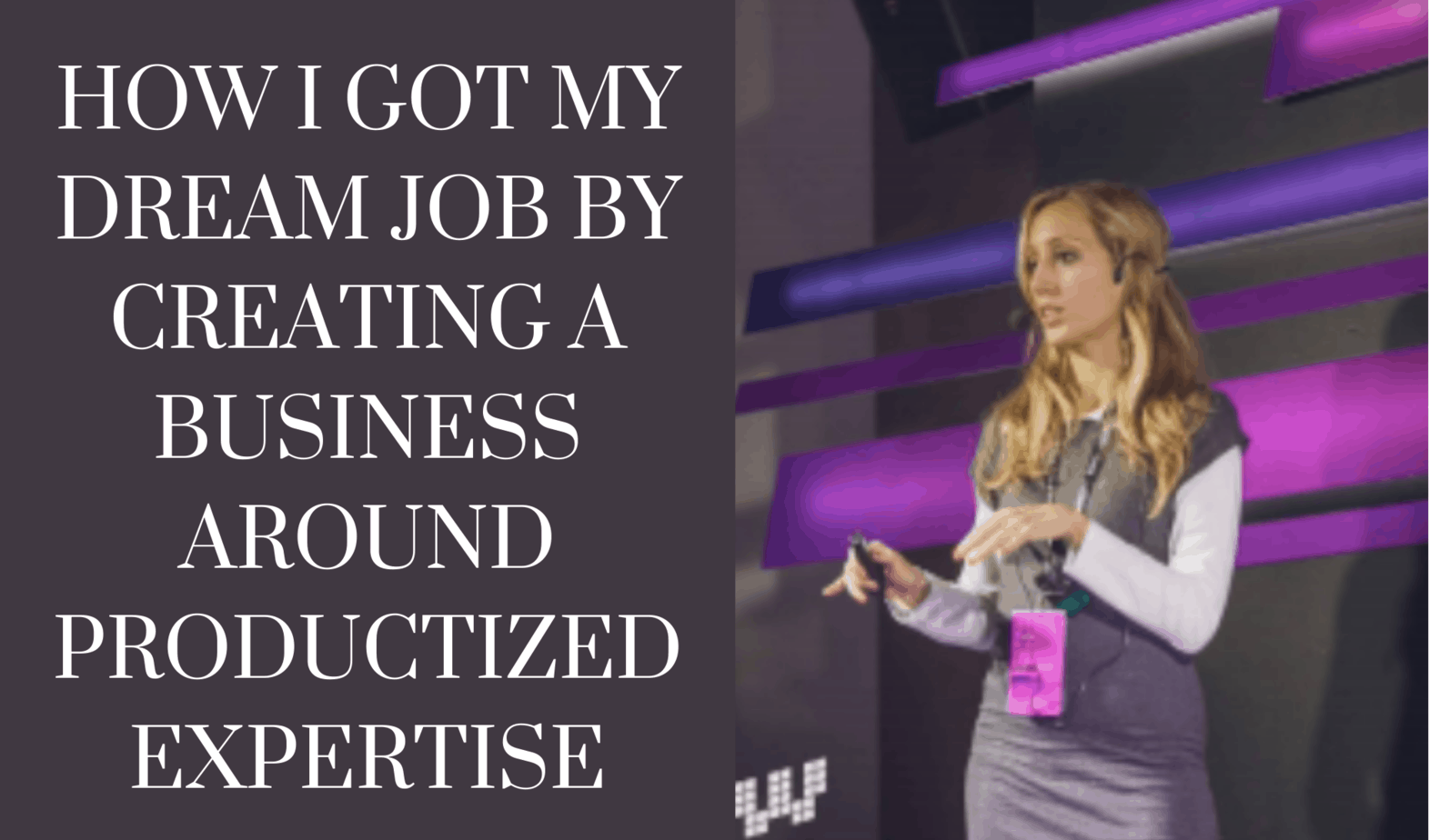 You can look for a dream job, or you can create one 🙂 In the gig economy of today, that is a very realistic plan actually. By productizing your expertise and then developing a business around that product, you can work on what you are really good at, what keeps you motivated and what gives the best value to your clients
You can look for a dream job, or you can create one 🙂 In the gig economy of today, that is a very realistic plan actually. By productizing your expertise and then developing a business around that product, you can work on what you are really good at, what keeps you motivated and what gives the best value to your clients
I’m a software engineer (MSc Computer Sciences) and I started my career 10 years ago as a Java developer. After three years of working in the office environment and being employed in the traditional way, I decided to quit my job. And no, it was not over not having a good job, comfortable office, friendly colleagues and/or a boss. I had all of that. I simple didn’t want an office and a boss any more. Nor a job, for that matter. At least not a job in a traditional sense, showing up somewhere 9-5, getting allocated to projects at someone else’s will and travelling in the same manner. That said, I’m aware that there are many benefits of that setup, and it probably does work for some people, but it’s definitely not for everybody.
My trigger point happend to be the ocean. Yes, that’s right, the Big Blue. I’ve developed passion for windsurf and kitesurf and wanted to be able to travel to the best spots whenever I wanted and wrap my work around my life, instead of the opposite. That’s how I started freelancing back in 2010, completely remotely, at the time before the remote work and the digital nomad lifestyle became “a thing” 🙂 There were challenges with getting good projects, being accepted as a responsible professional, as well as having the right infrastructure to work while travelling (remember that was before the coworking spaces etc.) But, it was working out, I guess it just does when you really want it and set your mind to it, as well as accept that everything is a process and you need to work on it day by day.
I was getting more and more experienced in my own field – software engineering, as well as in the general area of freelancing – working with clients, selling your skills, being productive while working on the multiple projects while travelling, planning your finances without fixed salary etc. In addition, I was learning a lot about the startup world, as those were the companies contracting me, rather than the corporations based on the traditional 9-5 system. I found out that most of the startups, due to the limited budget and the fact that the initial, core team is usually super small, don’t really have proper management in place. More often than not, I was facing situations when a founder would contract just me and 1 or 2 other programmers, without proper specs, collaboration tools, any kind of team work management, release planning etc. This is where my other skills and experiences got into the picture – I used to do events management during the University and was in the international board of a student organization. I knew how to deal with people, timelines, resources. I was good at having the overview at all times, the big picture, the vision, the strategy. In addition, as a full time traveller, I was good with people, as I keep meeting new people on almost daily basis. And I was a software engineer to begin with. And so it happened that I was the very much needed bridge between the business and the tech side.
First I started managing projects and programming at the same time. Soon, I realized that those activities just don’t go hand in hand, as by its’ nature programming requires “no interrupts” mode, and management is all about the communication and interaction. To cut the story short, I went the management way. In order to formalize my knowledge I got the Scrum and some other agile related certificates. I was working on projects in Scrum master, project manager and product manager roles. There are so many courses and resources online, learning became easier than ever.
At the same time, the gig economy is getting stronger. Now it’s not only the low-budget, marginal companies contracting freelancers working remotely. The serious players joined, the remote work became a culture and we all started openly advocating it as the future of work. I started joining coworking spaces, networking events and conferences.
By working on many projects, and talking to even more people on all sorts of nomad, startup etc. events, gradually I realized there is a gap – or a niche if you think as an entrepreneur – for everything that falls into the “business meets tech” category. The founders with amazing ideas were struggling to implement them, wasting a lot of effort into trying to assemble and lead a tech team, prepare efficient specs and plan releases etc., instead of being out there selling their idea and getting the money in. On most of the events I was visiting the “technical co-founder fever” was on, and it was difficult to find someone for that position in the first place, and often it would still end up with that person doing excellent programming but staying focused on just that. For a founder, truly painful
A recognized pain point plus an offered solution – means business. That is how I’ve founded StartupSetup where I help founders with everything from recruitment (programmers, QA specialists, UI/UX designers, branding strategist, copywriters etc.) and preparing specs, to setting up the correct tools and management processes and launching their MVPs. By offering management as a service, a productized service, I get to design that product of mine exactly the way I want – thus I got myself my dream job 🙂 And as my path was gradual and built on hands-on experiences working on various startup projects, my product actually brings a lot of value to my clients. In an simple and easy way – making it clear what value exactly they are buying. Packaging and branding are super important, like with any other product. When interacting with online and offline communities, don’t go just after the new clients. Go to listen. Listen to the struggles and challenges that people and business in the community are facing daily and think if you could be the solution.
My next step would of course be scaling. Hiring people to delegate work to. I don’t want to be a software company hiring programmers, locked into any technology. I will stick to the management as a service model and only hire assistants with management skills to delegate day to day tasks to, so that I can accept more clients and focus on big picture and strategies. And again, expertise is like any other product – you need to have a growth and investment strategy. It’s crucial to be able to balance between client work, networking, branding, learning new skills – upgrading and selling your product essentially.
It’s been an interesting journey, and still is. That’s why I enjoy sharing with the communities by writing blog posts and speaking at different events, on the topics as productized expertise, gig economy, managing remote freelance teams, nomadic lifestyle etc.
How I got the job? I created it 🙂 To learn how to recognize your superpower, why NOT to focus on CV, how to outsource and much more, read my bullet points guidance on selling your expertise as a productized service: How to sell your expertise as a service
Cheers!
Tijana Momirov is a software engineer, product manager and founder of StartupSetup where she helps founders start their startups, all in a remote, agile and super lean way leveraging the gig economy. She’s been a full time nomad since 2010 and loves blogging and giving talks about nomadic lifestyle, managing remote teams, future of work, the gig economy, productized services and more. Learn more about me at www.TijanaMomirov.com
